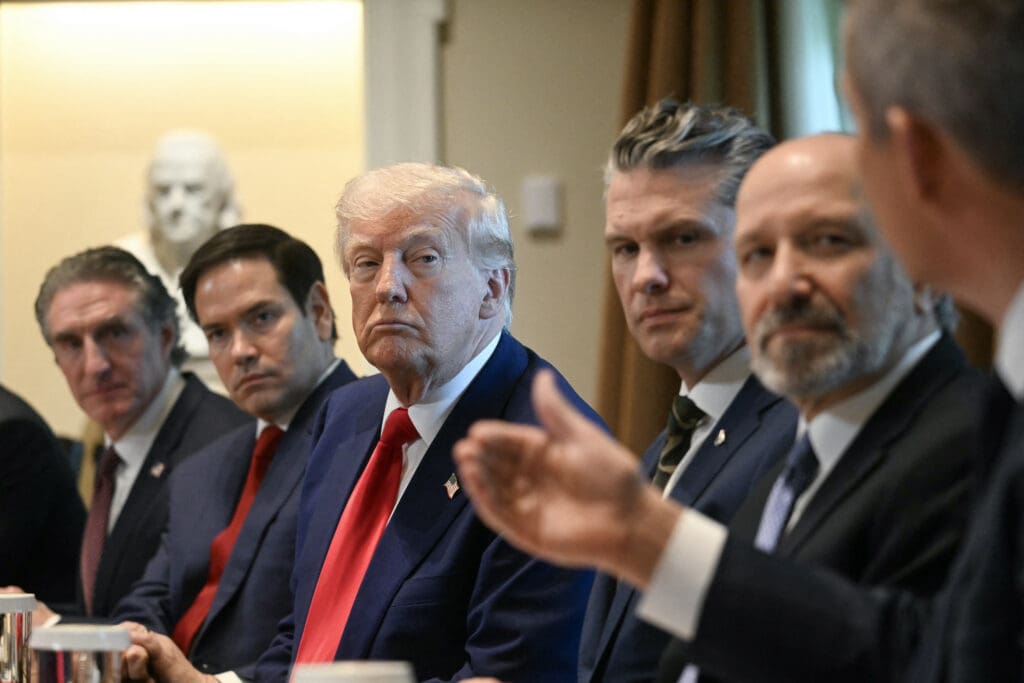Spurred on by Elon Musk and the Department of Government Efficiency, or DOGE, the second Trump administration has embarked upon a campaign of massive disruption within the federal government that will have serious implications for U.S. foreign policy in the Middle East and North Africa (MENA). One of the primary targets is the State Department. Word of a major department reorganization first leaked in a memo on April 15, which envisioned a nearly 50 percent reduction in the State Department’s budget from $58.8 billion in the 2025 fiscal year to $28.4 billion in FY2026, along with a major reorganization of the department and reduction in the number of its employees. Secretary of State Marco Rubio immediately characterized the memo as “fake news.”
Yet a week later, Rubio released a new organizational chart. He also released a brief statement that, in its current form, the department he leads is “bloated, bureaucratic and unable to perform its essential diplomatic mission.” On Friday, May 2, the Trump administration released its FY26 budget proposal to Congress. It envisions cuts totaling $27.47 billion in State Department and former USAID funding, targeting a broad swath of activities including support for economic development, international disaster assistance, peacekeeping, contributions to international organizations, education and cultural exchanges, democracy and global health programs among others.
Alongside these directives, on April 18 the president issued an executive order intended to strip civil service protections from around 50,000 federal employees—roughly 2 percent of the federal workforce—including all career civil servants with “important policy-determining, policy-making, policy-advocating or confidential duties.” Branded as “Restoring Accountability to Policy-Influencing Positions Within the Federal Workforce,” the order would allow civil servants to be fired at-will without recourse to traditional legal and institutional protections, for reasons that could include poor performance, misconduct, corruption or the vaguely worded “subversion of Presidential directives.”
Taken together, these two sets of initiatives are likely to have profound implications for the conduct of American foreign policy in both the MENA region and beyond. The administration is considering plans to close multiple embassies and consulates, including the consulate in South Sudan. The Office of Undersecretary for Civilian Security, Democracy and Human Rights, which the administration has called “a hotbed of liberal activism,” would be eliminated. The Bureau of Near Eastern Affairs would be reorganized to incorporate Afghanistan and Pakistan, expanding its emphasis beyond the Arab nations and Iran.
The reorganization envisions staffing cuts of 15 percent, or around 2,000 employees. These cuts are likely to significantly reduce the quality of policy analysis, with fewer staff available to gather data, meet with counterparts, analyze press reports and write policy briefs. This will compromise the information available to senior decisionmakers and ultimately degrade the quality of U.S. decision-making.
The loss of staff could also compromise the work of commercial attachés, limiting their ability to advance American trade and investment throughout the region. A reduction in consular staff could diminish travel to the United States for education and tourism, as well as raise the possibility that some bad actors could avoid detection and slip into the country.
The administration’s plans represent a fundamental blow to the long, complex and problematic effort to advance the cause of “good governance” in MENA. The National Endowment for Democracy (NED), a leading source of support for many initiatives targeted at democracy promotion, has had its budget of $315 million entirely slashed. (NED has challenged this move in court.) Support for other democracy promotion activities, which bolstered civil society groups and exchanges through small grants and scholarships, had already experienced a prolonged decline from their heyday under an earlier Republican president, George W. Bush. An average of over $70 million annually was spent on the Middle East Partnership Initiative (MEPI) from 2003 to 2013, which served as an important source of support for Arab civil society movements. By 2024, MEPI’s funding had already been drawn down to $25 million. In January 2025, the Trump Administration’s Office of Management and Budget (OMB) flagged MEPI for particular scrutiny. In March, the Middle East Regional Cooperation (MERC) program, which was created in 1979 to foster exchanges between Israeli and Arab citizens, was also shut down.
More broadly, as The Independent notes, the conduct of American foreign relations will shift from a traditional values-based diplomacy that works through mutual interests and multilateral alliances to a more transactional model that prioritizes self-interest. Initial proposals envisioned eliminating the Bureau of African Affairs, for example, and focusing American foreign policy on that continent narrowly on counter-terrorism and obtaining access to critical natural resources. Cuts to humanitarian assistance, global health and international organizations will alienate allies, reduce the policy levers available to U.S. decisionmakers and eliminate the areas of American foreign policy that are most popular within MENA.
The implications of some of these cuts, such as the dismantling of USAID, have received significant attention. In short, they will fundamentally curtail America’s soft-power; open the door for U.S. adversaries to expand their influence; increase the risk of terrorism and instability; and perhaps most tragically, place the lives of hundreds of thousands of vulnerable Palestinians, Syrians and Yemenis at risk.
Among the more problematic impacts is that the coherence and continuity of American foreign policy will suffer, and it will become more prone to broad swings and oscillations. Cuts to the U.S. Foreign Service will degrade institutional memory, while efforts to trim back civil service protections will reduce the willingness of staff to speak out and risk their careers and reputations—leaving policy-making more top-down and less rigorous. The result will be fewer guardrails and less pushback on bad ideas, such as President Trump’s recent announcement that the United States will ultimately assume responsibility for Gaza—a proposal that was viewed by virtually all regional and international observers beyond the Israeli hard-right as a political non-starter that would contravene the established laws of war.
The ultimate outcome of these budget cuts remains to be determined. The administration’s proposal is the opening salvo in a protracted exchange with Congress, which ultimately wields the power of the purse. Yet it serves as a clear indicator of the Trump administration’s intent to withdraw from America’s global leadership role and traditional foreign policy commitments in MENA and elsewhere in favor of a much more restricted focus upon homeland security and defense. While there is evidence that some Congressional Republicans are beginning to balk at the depth of the reductions proposed by the White House, their resistance has focused largely upon domestic cuts that will directly impact their constituents. The president has historically exerted more influence over foreign policy, and it is unlikely that there will be serious opposition to his proposals in the Senate and the House of Representatives.
While there is much to be risked, the fiscal gains will be negligible. If fully implemented, the proposed cuts would save roughly 50 cents out of every $100 spent by the federal government. For these modest savings, the Trump administration will erode U.S. influence abroad and find itself less able to navigate a Middle East that will become increasingly unsettled.


